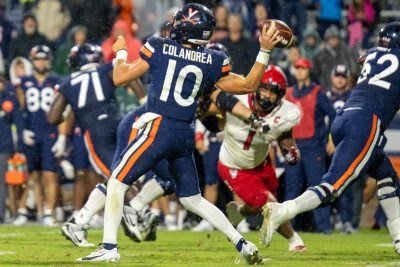Colandrea showing signs of maturity as Virginia’s quarterback
By Jerry Ratcliffe
The maturation of a quarterback can age his coaching staff, but when he truly “gets it” and everything begins to click, it’s a thing of beauty.
Virginia’s offensive staff has watched true freshman Anthony Colandrea go through the frustrating growing pains this season. The three-straight interceptions at Maryland, the penalty after the 2-point conversion against NC State, getting stripped of the football on a run when he refused to slide.
It’s all part of the process, and there’s really no way to accelerate the growing, the learning, other than experience.
Out in Louisville last week, Colandrea seemingly made a giant step forward, making smarter decisions in every aspect of the game. He was playing in only his sixth game, passing for 314 yards, rushing for 89, and had a chance to pull off an upset over the then-11th ranked Cardinals on the road in a 31-24 loss.
In four starts this season, the St. Petersburg, Fla., native has averaged 306.3 yard passing. Having played in parts of two other games, Colandrea hasn’t put in enough time to qualify for conference statistics at this point, but if his six games were to count, he would be well ahead of some players who have played in 9 or 10 games.
Colandrea is expected to start against Duke on Saturday (3 p.m. on the CW network) at Scott Stadium in UVA’s next-to-last game of the year. In a 2-8 season of disappointment, the golden-haired Florida freshman has supplied excitement and hope for the future. Coach Tony Elliott knows that Colandrea can produce, but can he deliver wins? That remains to be seen.
“Yeah, so it looks like the game has slowed down,” Elliott said about his quarterback this week. “He looks more decisive in where he’s going with the football and he can get into multiple progressions, which tells you that it has slowed down.
“You even saw some instances throughout the course of the week in practice and a couple in the game where he’s changing his protection, so he’s starting to understand how to protect himself from a schematic standpoint.”
Those are signs to coaches that the quarterback has a greater understanding, that the game is slowing down for him, when he can call audibles. When all that happens, a quarterback can take more advantage of the run game, QB runs.
“He’s not there yet, just because that’s something we have to build to,” said Elliott, who has worked with outstanding quarterbacks during his stint at Clemson as offensive coordinator. “Easily can get to those, but we haven’t invested as much time in it because we’re trying to get the fundamentals of operating the offense, all the motions, the procedural stuff, the pass concepts, the reads, some of your run-game checks.”
Still, Colandrea has managed to become a menace as a running quarterback, whether it be on QB draws or scrambles. Of course, that can take a physical toll as well until the freshman learns to run out of bounds or slide rather than taking the full brunt of the hit from defenders.
Virginia’s strength coaches will work on that aspect, building his body in the offseason, so Colandrea will be more capable of taking some of the punishment that comes along with that part of the job.
Eventually, he can develop into a dangerous dual-threat QB, a traditional drop-back passer from the pocket and as a runner.
“I think you can do a lot of things, but it’s just going to be a matter of what he can absorb, how fast he can absorb it, and then week to week schematically where does it give us an advantage,” Elliott said.
Colandrea already has five 200-plus yard passing games to his credit this season and two 300-plus passing games. He ranks seventh among FBS freshmen quarterbacks in passing yards (1,437) and 11th in touchdowns (8). He has already thrown for more yards and TDs than any freshman or redshirt freshman in Wahoo history. His 377 passing yards against unbeaten JMU is the fifth-best of any ACC quarterback this season.
At Louisville, Colandrea made better decisions on when to run, when to take a sack, when to throw the ball away, and seemed to advance his game. He was less likely to panic under pressure than some games in the past, again, all signs of the game beginning to slow down for him.
“He took care of the ball a lot better this past week,” Elliott said. “He didn’t see as many balls put into compromising situations. Even on the interception, he put it there. We’ve got to come down with that. Of course, you could say, well, he could throw it a little bit closer to the body, but still, we get two hands on the ball, we’ve got to catch that. That’s got to be our football.”
Colandrea handled the motions, did a good job handling the silent count (clapping) in a hostile and loud environment, and was smarter on when to pull the ball down and run, all signs of a quarterback maturing.
Now, he has to go out against a well-coached and talented Duke defense on Saturday, and take another step in the right direction.









